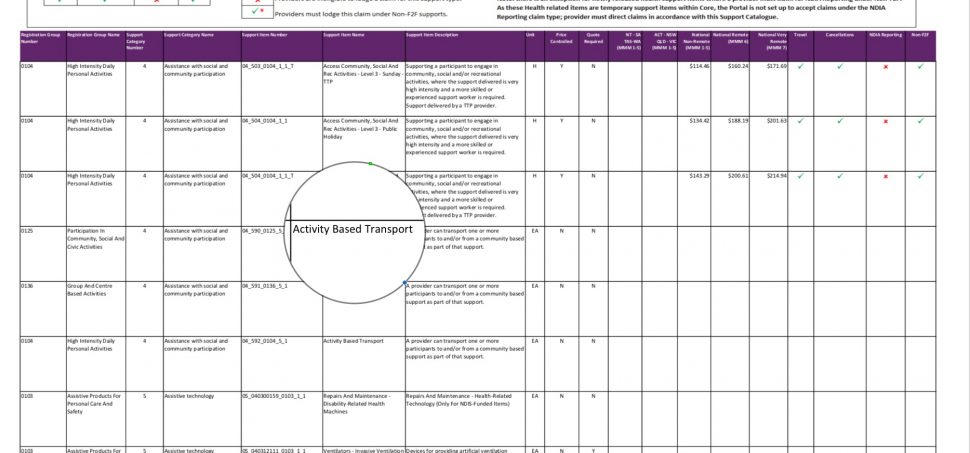Transport and the NDIS. It’s as clear as … mud

At the time we said the devil would be in the detail. Well that new price guide landed this week. And it came with horns and a pitchfork.
First the good news
People who have funding for “community based activities” can pay providers to transport them to those activities. The activities covered are:
- Assistance with social and community participation
- Improved living arrangements
- Increased social and community participation
- Finding and keeping a job (except SLES)
- Improved relationships
- Improved learning
This is now called “activity based transport”. Under each of these categories there is now a separate line item for transport for providers to charge against.
So what does this mean? It means if your provider takes you out for “community participation”* they can now charge you for the travel as well as the support worker’s time. And this can be paid out of your core funding.
It means you are not out of pocket and neither is your provider.
And while there are no set prices for these things, the NDIS has suggested the following prices are “reasonable”:
- up to $0.85 a kilometre for a vehicle that is not modified for accessibility
- up to $2.40 a kilometre for a vehicle that is modified for accessibility or a bus
- other forms of transport or associated costs up to the full amount, such as road tolls, parking, public transport fares.
Providers are expected to discuss these costs with participants. Participants should NOT be charged without their agreement.
So just to be crystal clear – people will only be able to claim transport out of their core funds if they are going somewhere where they are supported by the transport provider.
Now we know for some people this will really help. So that’s the good news.
Now the completely baffling news
The NDIA have also created a category called “general transport”. This is where participants pay a provider for transport to an “activity that is not itself a support – or to a support that is delivered by another provider”.
What does that bunch of gobbledegook mean? It pretty much means transport to anything else. Transport to your job, transport to a medical appointment, transport to go and see a friend, transport to an activity run by a different provider.
This kind of transport can’t be claimed out of core and must come out of your designated transport funding. That’s the infamous Level 1, 2 and 3 transport payment that is periodically dumped in your bank account. That’s if you get any of course.
So this has created the very baffling situation where you can claim for one kind of activity – but not for another.
Let’s illustrate with an example from our good friends at The Growing Space.
Let’s say you want to try out a local dance class. But you need a bit of support from a support worker to be able to take part – particularly at the beginning.
Providing you have funding for that in your plan (that’s a whole other issue) under these new rules you can pay for the support worker – but you can’t pay for the support worker to transport you to the class.
In contrast – if you attend a special dance class run by a specialist disability service provider you can claim the cost of travel to that class. As long as the provider running the class is the one that takes you to that class.
Hmmm. A scheme that encourages people to rely on specialist services rather than attending stuff already happening out in the community? Not the NDIS we all fought for.
What happened to the goal of the scheme to “increase social and economic participation”?
Not to mention that creating an incentive to rely on formal disability services rather than doing stuff in the community is NOT a very smart way to create a sustainable NDIS (like we are always hearing about).
It also means that people who cannot attend the activity in person (such as people who are housebound) can’t claim any transport costs.
We certainly hope this is just a “whoops unintended consequences” moment and things get cleared up very soon.
Anything else?
In another welcome move the price guide was released with some questions and answers for participants to help make sense of it all. This doesn’t always happen so it was good to see.
But unfortunately rather than clearing things up, some of the answers just left us more confused.
And we weren’t the only ones. We’ve been asked questions like:
❓ If you get the periodic transport payment can you also claim transport out of your core funding (as long as you follow the new rules of course) ie – can you do both?
❓Does anything change for self managed participants?
❓In general the price guide separates community activities from centre based activities. Does that mean people who are travelling to centres can’t use these new line items?
❓How does this affect people who use individual support workers? Particularly people who pay them through a platform or through an ABN? Can they use their core funding?
Any others? Either comment below or send them through to
We are trying to get answers – and we promise to share when we do.
Links
NDIS moves on transport! – Every Australian Counts
Understanding the Price Guide – NDIS
Price guide and Support Catalogue – NDIS
*we put that in inverted commas because nobody – and we mean NOBODY – talks like that outside NDIS land. Who the hell in the real world talks about “accessing the community”? We just go out right?


Join the conversation